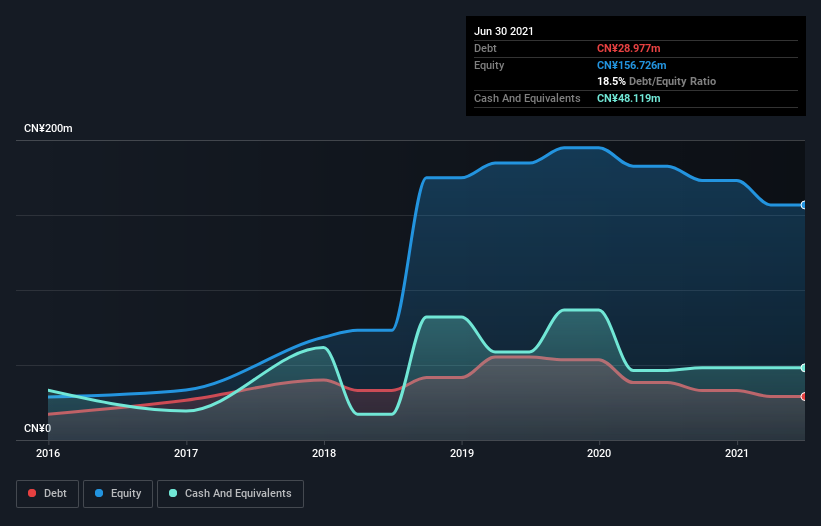
Some say volatility, rather than debt, is the best way to think about risk as an investor, but Warren Buffett famously said that 'Volatility is far from synonymous with risk.' When we think about how risky a company is, we always like to look at its use of debt, since debt overload can lead to ruin. Importantly, Miji International Holdings Limited (HKG:1715) does carry debt. But is this debt a concern to shareholders?
Why Does Debt Bring Risk?
Debt and other liabilities become risky for a business when it cannot easily fulfill those obligations, either with free cash flow or by raising capital at an attractive price. Ultimately, if the company can't fulfill its legal obligations to repay debt, shareholders could walk away with nothing. However, a more usual (but still expensive) situation is where a company must dilute shareholders at a cheap share price simply to get debt under control. Having said that, the most common situation is where a company manages its debt reasonably well - and to its own advantage. When we examine debt levels, we first consider both cash and debt levels, together.
Check out our latest analysis for Miji International Holdings
What Is Miji International Holdings's Debt?
The image below, which you can click on for greater detail, shows that Miji International Holdings had debt of CN¥29.0m at the end of June 2021, a reduction from CN¥38.3m over a year. But it also has CN¥48.1m in cash to offset that, meaning it has CN¥19.1m net cash.

How Healthy Is Miji International Holdings' Balance Sheet?
According to the last reported balance sheet, Miji International Holdings had liabilities of CN¥50.9m due within 12 months, and liabilities of CN¥7.10m due beyond 12 months. Offsetting this, it had CN¥48.1m in cash and CN¥46.7m in receivables that were due within 12 months. So it actually has CN¥36.8m more liquid assets than total liabilities.
This surplus suggests that Miji International Holdings is using debt in a way that is appears to be both safe and conservative. Given it has easily adequate short term liquidity, we don't think it will have any issues with its lenders. Simply put, the fact that Miji International Holdings has more cash than debt is arguably a good indication that it can manage its debt safely. When analysing debt levels, the balance sheet is the obvious place to start. But you can't view debt in total isolation; since Miji International Holdings will need earnings to service that debt. So if you're keen to discover more about its earnings, it might be worth checking out this graph of its long term earnings trend.
Over 12 months, Miji International Holdings made a loss at the EBIT level, and saw its revenue drop to CN¥160m, which is a fall of 31%. To be frank that doesn't bode well.
So How Risky Is Miji International Holdings?
Although Miji International Holdings had an earnings before interest and tax (EBIT) loss over the last twelve months, it generated positive free cash flow of CN¥7.2m. So taking that on face value, and considering the net cash situation, we don't think that the stock is too risky in the near term. With mediocre revenue growth in the last year, we're don't find the investment opportunity particularly compelling. There's no doubt that we learn most about debt from the balance sheet. But ultimately, every company can contain risks that exist outside of the balance sheet. To that end, you should learn about the 3 warning signs we've spotted with Miji International Holdings (including 1 which shouldn't be ignored) .
At the end of the day, it's often better to focus on companies that are free from net debt. You can access our special list of such companies (all with a track record of profit growth). It's free.
New: Manage All Your Stock Portfolios in One Place
We've created the ultimate portfolio companion for stock investors, and it's free.
• Connect an unlimited number of Portfolios and see your total in one currency
• Be alerted to new Warning Signs or Risks via email or mobile
• Track the Fair Value of your stocks
Have feedback on this article? Concerned about the content? Get in touch with us directly. Alternatively, email editorial-team (at) simplywallst.com.
This article by Simply Wall St is general in nature. We provide commentary based on historical data and analyst forecasts only using an unbiased methodology and our articles are not intended to be financial advice. It does not constitute a recommendation to buy or sell any stock, and does not take account of your objectives, or your financial situation. We aim to bring you long-term focused analysis driven by fundamental data. Note that our analysis may not factor in the latest price-sensitive company announcements or qualitative material. Simply Wall St has no position in any stocks mentioned.
About SEHK:1715
Volcano Spring International Holdings
An investment holding company, develops, manufactures, and sells kitchen appliances primarily in the People’s Republic of China.
Slight and slightly overvalued.
Market Insights
Community Narratives




